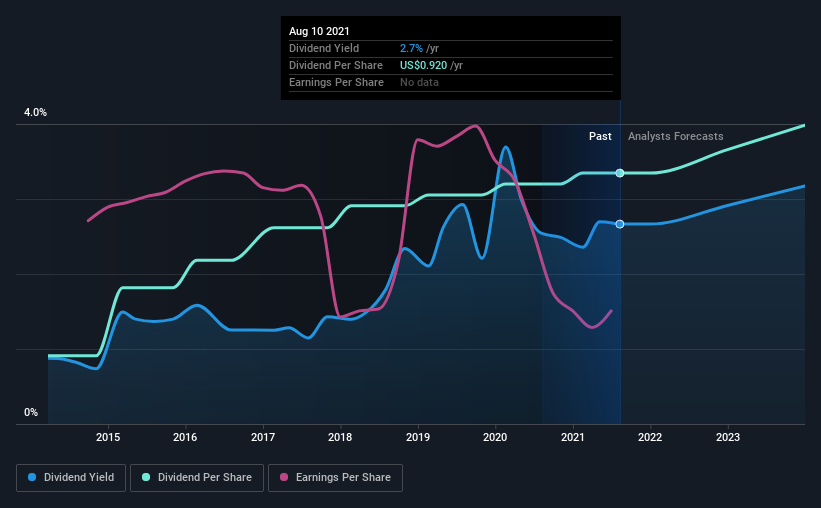- United States
- /
- Real Estate
- /
- NYSE:RMAX
Do These 3 Checks Before Buying RE/MAX Holdings, Inc. (NYSE:RMAX) For Its Upcoming Dividend

RE/MAX Holdings, Inc. (NYSE:RMAX) is about to trade ex-dividend in the next 4 days. The ex-dividend date is one business day before the record date, which is the cut-off date for shareholders to be present on the company's books to be eligible for a dividend payment. It is important to be aware of the ex-dividend date because any trade on the stock needs to have been settled on or before the record date. This means that investors who purchase RE/MAX Holdings' shares on or after the 16th of August will not receive the dividend, which will be paid on the 31st of August.
The company's next dividend payment will be US$0.23 per share, on the back of last year when the company paid a total of US$0.92 to shareholders. Based on the last year's worth of payments, RE/MAX Holdings stock has a trailing yield of around 2.7% on the current share price of $34.52. If you buy this business for its dividend, you should have an idea of whether RE/MAX Holdings's dividend is reliable and sustainable. So we need to investigate whether RE/MAX Holdings can afford its dividend, and if the dividend could grow.
Check out our latest analysis for RE/MAX Holdings
Dividends are typically paid out of company income, so if a company pays out more than it earned, its dividend is usually at a higher risk of being cut. RE/MAX Holdings distributed an unsustainably high 149% of its profit as dividends to shareholders last year. Without more sustainable payment behaviour, the dividend looks precarious. Yet cash flow is typically more important than profit for assessing dividend sustainability, so we should always check if the company generated enough cash to afford its dividend. Luckily it paid out just 23% of its free cash flow last year.
It's disappointing to see that the dividend was not covered by profits, but cash is more important from a dividend sustainability perspective, and RE/MAX Holdings fortunately did generate enough cash to fund its dividend. Still, if the company repeatedly paid a dividend greater than its profits, we'd be concerned. Extraordinarily few companies are capable of persistently paying a dividend that is greater than their profits.
Click here to see the company's payout ratio, plus analyst estimates of its future dividends.

Have Earnings And Dividends Been Growing?
Businesses with shrinking earnings are tricky from a dividend perspective. Investors love dividends, so if earnings fall and the dividend is reduced, expect a stock to be sold off heavily at the same time. RE/MAX Holdings's earnings per share have fallen at approximately 14% a year over the previous five years. When earnings per share fall, the maximum amount of dividends that can be paid also falls.
The main way most investors will assess a company's dividend prospects is by checking the historical rate of dividend growth. In the last seven years, RE/MAX Holdings has lifted its dividend by approximately 20% a year on average. The only way to pay higher dividends when earnings are shrinking is either to pay out a larger percentage of profits, spend cash from the balance sheet, or borrow the money. RE/MAX Holdings is already paying out 149% of its profits, and with shrinking earnings we think it's unlikely that this dividend will grow quickly in the future.
The Bottom Line
Should investors buy RE/MAX Holdings for the upcoming dividend? It's not a great combination to see a company with earnings in decline and paying out 149% of its profits, which could imply the dividend may be at risk of being cut in the future. Yet cashflow was much stronger, which makes us wonder if there are some large timing issues in RE/MAX Holdings's cash flows, or perhaps the company has written down some assets aggressively, reducing its income. Overall it doesn't look like the most suitable dividend stock for a long-term buy and hold investor.
With that being said, if you're still considering RE/MAX Holdings as an investment, you'll find it beneficial to know what risks this stock is facing. For example, we've found 5 warning signs for RE/MAX Holdings that we recommend you consider before investing in the business.
We wouldn't recommend just buying the first dividend stock you see, though. Here's a list of interesting dividend stocks with a greater than 2% yield and an upcoming dividend.
When trading RE/MAX Holdings or any other investment, use the platform considered by many to be the Professional's Gateway to the Worlds Market, Interactive Brokers. You get the lowest-cost* trading on stocks, options, futures, forex, bonds and funds worldwide from a single integrated account. Promoted
New: AI Stock Screener & Alerts
Our new AI Stock Screener scans the market every day to uncover opportunities.
• Dividend Powerhouses (3%+ Yield)
• Undervalued Small Caps with Insider Buying
• High growth Tech and AI Companies
Or build your own from over 50 metrics.
This article by Simply Wall St is general in nature. We provide commentary based on historical data and analyst forecasts only using an unbiased methodology and our articles are not intended to be financial advice. It does not constitute a recommendation to buy or sell any stock, and does not take account of your objectives, or your financial situation. We aim to bring you long-term focused analysis driven by fundamental data. Note that our analysis may not factor in the latest price-sensitive company announcements or qualitative material. Simply Wall St has no position in any stocks mentioned.
*Interactive Brokers Rated Lowest Cost Broker by StockBrokers.com Annual Online Review 2020
Have feedback on this article? Concerned about the content? Get in touch with us directly. Alternatively, email editorial-team (at) simplywallst.com.
About NYSE:RMAX
RE/MAX Holdings
Operates as a franchisor of real estate brokerage services in the United States, Canada, and internationally.
Good value with moderate growth potential.


